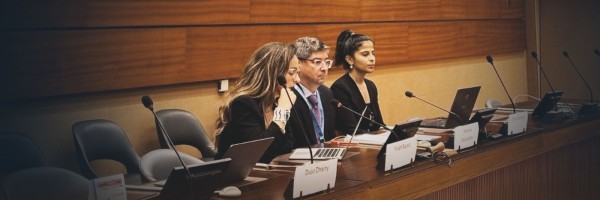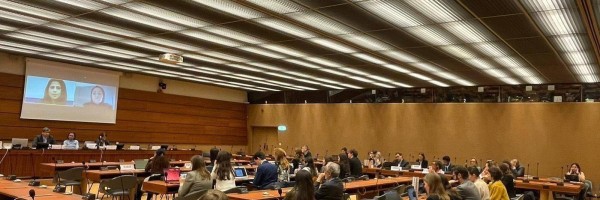On 16 March 2021, ALQST's Head of Advocacy Julia Legner spoke before the European Parliament Subcommittee on Human Rights in a briefing on human rights developments in Saudi Arabia, which can be viewed here. You can read her remarks below.
Dear Chair, honourable members of the Committee, colleagues,
It is a pleasure to be speaking to you on behalf of ALQST for Human Rights, which was founded in 2014 by the prominent Saudi human rights defender Yahya Assiri to defend and promote human rights in Saudi Arabia. This intervention is also being endorsed by the al-Hathloul family.
May I first of all thank all the MEPs who supported our joint statement on the occasion of International Women’s Day in support of Saudi women human rights defenders.
It’s extremely important for us all to realise that despite the Saudi authorities’ promises of reform, and their efforts over the past two years to convince the West that they are modernising, the human rights situation in Saudi Arabia has deteriorated significantly since Mohammed bin Salman became Crown Prince in 2017.
In 2015, as a defense minister, he already led his country into war with Yemen, causing thousands of civilian deaths and the world’s largest humanitarian crisis. Since then, he has also led an unprecedented crackdown on freedom of opinion and expression. Shortly after taking power, MBS ordered the first of several waves of mass arrests that together targeted hundreds of human rights defenders, women’s rights activists, journalists, academics, lawyers, religious figures, businessmen and even members of the royal family – in fact anyone critical of the authorities, or even simply failing to make a public declaration of loyalty to the regime. He also embarked on a campaign to surveille, intimidate and silence Saudi activists in the diaspora. The CIA report released last month officially confirmed what many had long suspected: that MBS ordered the gruesome murder of Jamal Khashoggi in the Saudi consulate in Istanbul. Only weeks after Khashoggi’s killing, the Crown Prince had the audacity to send the same killer squad to Canada to hunt down Saad Al Jabri, a former high ranking Saudi intelligence officer, fortunately without success.
Yet at the same time, the Saudi authorities have tried to improve their image by opening up to leisure tourism, prestigious sports events and Western-style entertainment, in a bid to attract foreign direct investment, and in particular by announcing reforms that claim to be empowering women. This is perhaps the area where the gap can be most starkly seen between positive, but largely superficial, reforms and the reality of continuing oppression.
Over the past two years, the Saudi authorities have lifted some of the restrictions women face under the country’s male guardianship system, including allowing women to apply for their own passports as well as granting them more control over family matters. This, however, came nowhere close to paving the way for gender equality in Saudi Arabia, as the male guardianship system continues to severely hamper women’s equal participation and decision-making in political, economic and social affairs, including in matters such as education, employment, health, marriage, and nationality.
What most clearly undermines the authorities’ claims of genuine reform on women’s rights is their treatment of the very women who have been at the forefront of the fight for women’s rights in Saudi Arabia and the direct involvement of the government in their defamation campaign. In 2018, a number of these women were arrested, tortured, and portrayed in the official media as traitors and spies. Some have been temporarily released while still on trial, but others, including Nassima al-Sadah and Samar Badawi, remain in detention. On 10 February this year, Loujain al-Hathloul was conditionally released by the Saudi authorities after spending over 1,000 days in prison, having served a sentence imposed by Saudi Arabia’s terrorism court, solely for her peaceful activism. While she is no longer in detention, she is still not free, as her sentence imposed heavy restrictions including three years of probation and a five-year travel ban – and was last week upheld at an appeal hearing.
There are other areas where reforms have been announced but the reality has not matched up to the rhetoric.
In 2020, the authorities issued a decree ending judges’ discretion to apply the death penalty to minors, yet it contained various loopholes leaving several ways in which minors can still be executed; and while Saudi Arabia’s official Human Rights Commission announced a moratorium on death penalties for drug-related offences in January of this year, there has not been any published change in the law to this date.
In October 2020, the authorities also announced reforms to the notorious kafala (sponsorship) system, under which foreigners employed in Saudi Arabia are tied to an individual sponsor, leaving them vulnerable to various forms of exploitation. Again, while a step forward, the new measures contain several loopholes, including by not protecting millions of domestic workers. This does not constitute the abolition of the kafala system and as we have seen with other Gulf states, partly-reformed kafala systems continues to facilitate abuse.
One of the main shortcomings of legal reforms on paper in Saudi Arabia, no matter how significant, is that there is no public involvement or representation in influencing or deciding these reforms, in monitoring their application, or in reporting any problems in their implementation. For reform to be meaningful it has to be grounded in public needs and informed by the public’s feedback and engagement.
But we are encouraged to see the Saudi authorities coming under mounting pressure from an increasingly critical international community. We have seen strong resolutions from this Parliament demanding accountability for the murder of Khashoggi as well as the immediate and unconditional release of the WHRDs. At the UN Human Rights Council, three unprecedented joint statements by a large number of UN member states have echoed these requests. In the run up to the G20 last year, as awareness of the Saudi authorities’ violations increased, several European and American mayors pulled out of a G20 city leaders’ forum; the European Parliament voted to downgrade G20 attendance; and in October 2020 Saudi Arabia lost its bid for re-election to a further term on the UN Human Rights Council.
Joe Biden’s election as President of the United States, and his pledge to reset the relationship between Washington and Riyadh after four years of uncritical support from Donald Trump, have intensified this pressure and already had an impact. It seems likely that some recent announcements on proposed reforms, and the temporary release or more lenient sentencing of some prominent activists, have come about in response to all this intense scrutiny.
It is therefore crucial for the international community to seize the moment – to maintain and intensify this pressure on the Saudi authorities to end their grave human rights violations and undertake genuine human rights reforms. Which brings me to what I’d like to ask of you.
In December 2020, the EU established its global human rights sanctions regime, a framework that will allow it to target individuals, entities and bodies responsible for, involved in or associated with serious human rights violations and abuses worldwide. We ask that you use this sanctions regime to hold to account not only the henchmen who carried out the operation to kill Khashoggi, but the man at the very head of the chain of command, the Crown Prince Mohammed bin Salman himself.
The European Union has a long and proud track record of supporting human rights and the rule of law across the world. We therefore kindly ask that you keep up the pressure on the Saudi authorities to comply with international human rights standards, and to make structural human rights reform a precondition for any future economic collaboration with Saudi Arabia.
Meanwhile and as a litmus test to the Saudi authorities’ genuine intention to reform the country, we ask you to urge them to release all human rights defenders and prisoners of conscience, including the WHRDs; drop the charges against them; and allow them to engage in peaceful human rights activism without fear of reprisals.
I thank you for your kind attention and I will be happy to answer any remaining questions you may have.




